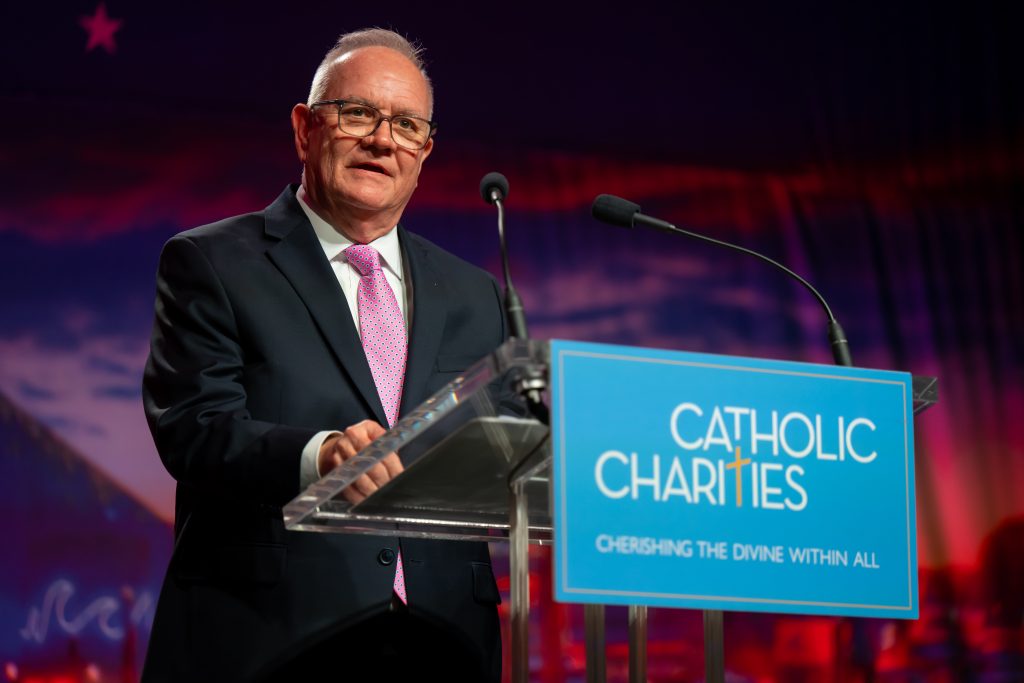By Adam Stone

William McCarthy, J.D. ’87, retired recently after 16 years as executive director of Catholic Charities of Baltimore, the state’s largest private provider of human services. He inaugurated or expanded a slew of programs there, and the organization grew exponentially under his leadership.
McCarthy says UBalt Law started him down the road to public service and helped to drive his success. “My legal training taught me to think things through in a long, logical way, with a healthy perspective,” he says. That matters, he adds, “because in every issue, there’s at least two sides, if not more.”
McCarthy took a winding road from law school to human services.
“I went to law school thinking I wanted to change the world: Seeking justice, representing people in the cases that mattered and that would bring about fundamental change,” he says. He started out in litigation at a small downtown Baltimore law firm and found that those cases didn’t actually bring about societal change.
From there he migrated to tax and estate work, and after a few years of doing that, “I realized I had become one of those regulatory or statutory lawyers,” he says. “I woke up one day — it was when our son Ryan was born — and I knew I wanted to do something different.”
He had done a lot of work on trusts and tax planning, “so I went to the First National Bank of Maryland, in the personal trust area,” he says. He rose through the ranks; a merger took him to M&T Bank, and from there became president of Baltimore-based SunTrust.
He was successful, but he still wasn’t saving the world. It took a family tragedy to get him back on that path.
A turning point
A daughter, Erinn, came along, “and when she was 11 — this would have been 18 years ago — she was diagnosed with osteosarcoma, a rare form of bone cancer,” McCarthy says. “I watched her live every day with courage, grace and purpose, as she fought this terrible disease for 3½ years.”
Erinn spent 32 weeks in her first year in the hospital, receiving chemotherapy and a partial knee and femur replacement. “Then after a year, the cancer went into remission and she was able to stay up with school and continue her relationships with her friends,” he says.
But the cancer came back, with vigor. Before Erinn passed away, at age 14, her parents asked what they could do in her memory. At her request, the humanities building and fields at Maryvale Preparatory School are named in Erinn’s memory.
Improving lives
As McCarthy mourned the loss, he took a hard look at his next move.
“I wanted to do something where I knew that every day, what I did mattered: That people were being helped, lives were being improved, and our community was being made stronger,” he says. Then the top role at Catholic Charities opened up. “I’m a kid from west Baltimore who happens to be a lawyer, so I put my name in the hat.”
It was a logical fit, says former law school classmate and former Maryland First Lady Kendel Ehrlich, J.D. ’87. “He has the ability to make his point, often using humor and self-deprecation, giving his audience a warm feeling. I am sure this made him an effective fundraiser,” she says.
Another UBalt Law classmate, Hon. Kevin Mahoney, J.D.’87, a judge on the Harford County Circuit Court, recalls that as an attorney, “Bill was always trying to help people accomplish and achieve certain goals. So Catholic Charities was a natural shift for him — to be in a place where he could be just unequivocally be helping people and the community.”
(Full disclosure: Mahoney may be a tad biased, “I married Bill’s sister,” he notes.)
As McCarthy concludes his tenure at Catholic Charities, he says he’s proud of the organization’s “ability to respond to ever-changing needs in community,” from gun-violence reduction to opioid-crisis response to affordable senior housing.
And he says there’s always opportunity to do more — if people are willing to put in the work over the long haul.
“I am boldly optimistic,” he says. When it comes to generational poverty in particular, “these conditions didn’t occur overnight, and we have to have a longer view to fix them. There aren’t silver bullets. It takes continuous support and commitment, not just a passing interest.”
Adam Stone is a writer based in Annapolis.
